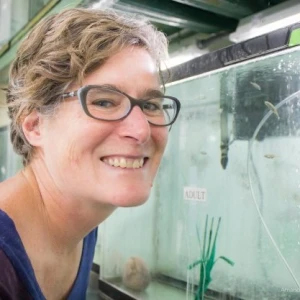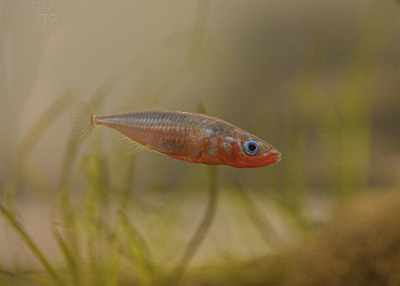MSU’s Janette Boughman selected as a Fulbright U.S. Scholar
Janette Boughman, professor of integrative biology in the Michigan State University College of Natural Science, has been selected as a Fulbright U.S. Scholar for international academic exchange for the 2022-23 academic year. The program offers more than 400 awards in 135 countries annually for U.S. citizens to teach, conduct research and carry out professional projects around the world.

As a Fulbright U.S. Scholar, MSU integrative biologist Janette Boughman will collaborate with Australian biologists to study how specific ecological changes alter the evolutionary processes that impact biodiversity. Courtesy photo
Boughman will collaborate with leading Australian biologists at Monash University and the University of New South Wales to study how specific ecological changes alter the evolutionary processes that generate and maintain biodiversity. The title of her project is “Speciation and Maintaining Biodiversity in a Changing World.”
Fueled by the alarming pace of current ecological change and the loss of biodiversity worldwide, Boughman is committed to use her research to protect biodiversity and inform decision-making. Since anthropogenic change outpaces both species' evolutionary responses and our ability to manage such change, she is determined to make big strides with her Fulbright award.
“Biodiversity loss is a major challenge facing humanity and is particularly severe in Australia which has many unique and vulnerable ecosystems,” said Phil Duxbury, NatSci dean. “Dr. Boughman directs a world-leading research program understanding the diversity of life on earth by elucidating the processes that give rise to new species and new adaptations. This prestigious award will enable her to utilize her understanding of speciation and biodiversity to develop strategies to mitigate biodiversity loss in vulnerable ecosystems. Congratulations to Dr. Boughman on this well-deserved award.”

Boughman is internationally known for her research on the three-spine stickleback, in which she studies both natural selection and sexual selection and their roles in the process of diversification. She is particularly interested in how behavior influences diversification and how behavior itself evolves. Credit: Boughman lab
Boughman’s research focuses on understanding the diversity of life on Earth by studying the processes that give rise to new species and new adaptations. She is internationally known for her research on the three-spine stickleback, a species she and her team studies to understand how an organisms’ behavior generates selection that results in diversification, and how diverse behavior itself evolves under the influence of multiple forms of selection. A parallel research theme is to understand how organisms evolve in response to our continuously changing world, especially given the rapid and profound ecological changes humans cause.
For Boughman, receiving the Fulbright award allows her to shift the direction of her work toward more applied questions, an area she is most interested in for her future research.
“My Fulbright plan builds on my expertise and that of my hosts and extends that knowledge to help protect and sustain biodiversity,” Boughman said. “Working in the context of Australia's biology will elevate the project, because it contrasts with the types of ecosystems in which I have done the bulk of my research, primarily the Canadian rain forest and the Arctic.”
With her long history of international work and cultural exchange, Boughman knows that being immersed in another culture helps her look at problems in different ways, bringing new insights and perspectives to her work and back to MSU.
“I will serve as an ambassador for Fulbright by developing sustained collaborations with other scientists from the countries I visit to facilitate joint research grants, published papers and training of students. This will be a big boon to my research professionally, but also personally by expanding my understanding of other cultures, meeting new people and learning about the natural history in Australia.”
This is Boughman’s second Fulbright U.S. Scholar award. Her first was during the 2017-18 academic year, where she collaborated with biologists at Holar University College in Iceland to investigate the evolutionary ecology of sensory systems in the dynamic and changing arctic.Banner image: The three-spined stickleback is a fish native to most inland and coastal waters north of 30°N. It has long been a subject of scientific study for many reasons—it shows great morphological variation throughout its range, is an ideal model for questions about evolution and for its population genetics. Credit: Shutterstock/slowmotiongli